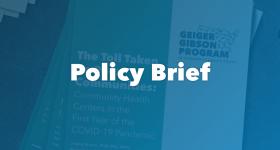The latest policy research brief by the Geiger Gibson/RCHN Community Health Foundation Research Collaborative, “The Role of Community Health Centers in Addressing the Needs of Uninsured Low Income Workers: Implications of Proposed Federal Funding Reductions,” examines the consequences of the proposed reductions in federal health center funding on access to health care for low-income workers.



